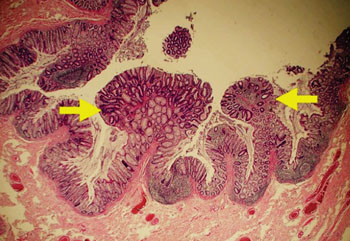Novel Gene Discovered for Hereditary Colon Cancer
By LabMedica International staff writers
Posted on 08 Aug 2016
The formation of large numbers of polyps in the colon has a high probability of developing into colon cancer, if left untreated. The large-scale appearance of polyps is often due to a hereditary cause; in this case the disease can occur in multiple family members.Posted on 08 Aug 2016
Colon polyps form like mushroom-shaped growths from the mucosa and are several millimeters to several centimeters in size. They are benign and generally do not cause any symptoms, however, they can turn into malignant tumors or colon cancer. Physicians refer to the development of a large number of polyps in the colon as “polyposis.”

Image: A histopathology of the colon with multiple Adenomatous polyps (Photo courtesy of Group14).
Scientists at the University of Bonn (Germany) and their colleagues investigated the genetic material (DNA) of polyposis patients using blood samples. They performed exome sequencing of leukocyte DNA from 102 unrelated individuals with unexplained adenomatous polyposis. In each patient, all of the about 20,000 protein-coding genes known were simultaneously examined. In this process, the scientists filtered the rare, possibly relevant genetic changes out of the gigantic quantity of data.
They identified two unrelated individuals with differing compound-heterozygous loss-of-function (LoF) germline mutations in the mismatch-repair gene MutS Homolog 3 (MSH3) on chromosome 5. Analysis of the diseased individuals’ tumor tissue demonstrated high microsatellite instability of di- and tetranucleotides (EMAST), and immunohistochemical staining illustrated a complete loss of nuclear MSH3 in normal and tumor tissue. By investigating the MSH3 gene, a clear diagnosis can be made prospectively in some other, previously unexplained polyposis cases. Afterwards, healthy persons at risk in the family can be tested for the mutations.
Stefan Aretz, MD, a professor and senior author of the study, said, “The challenge is proving the causal connection between the mutations in this gene and the disease. Only proven carriers would need to take part in the intensive surveillance program. The knowledge about molecular mechanisms which lead to cancer is also a precondition for the development of new targeted drugs.” The study was published on August 4, 2016, in the American Journal of Human Genetics.
Related Links:
University of Bonn













